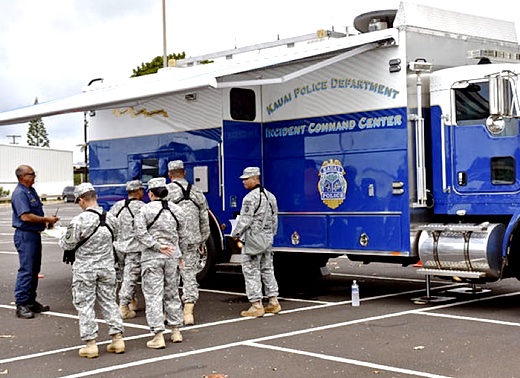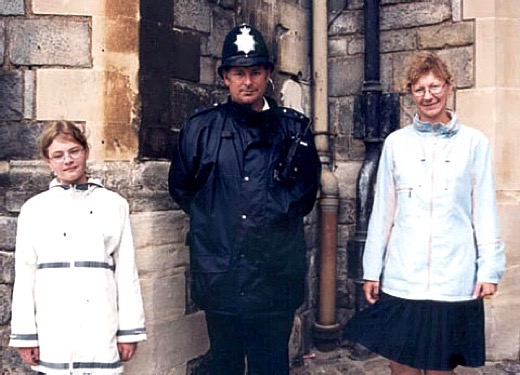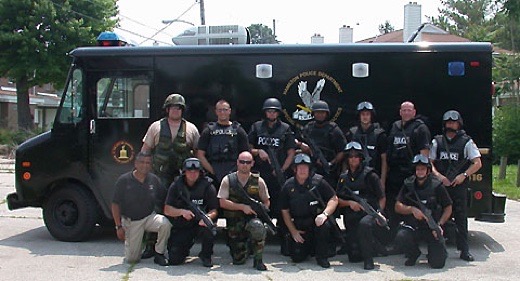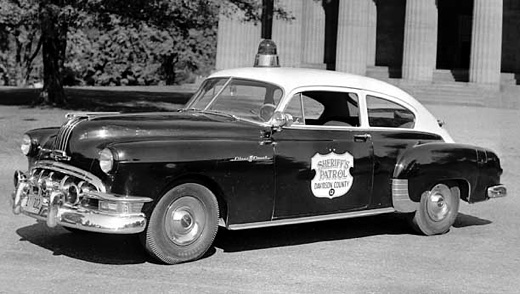SUBHEAD: In light of recent events involving violence between police and the citizens they "serve and protect".
By Juan Wilson on 11 June 2016 for Island Breath -
(http://islandbreath.blogspot.com/2016/07/the-police-among-us.html)

Image above:The Kauai Police Department Incident Command Center is a recently acquired armored truck with sophisticated communications equipment for command and control. The men in uniform are part of the Guam Civilian Support Team being briefed on an "incident" during the multi-agency preparedness exercise at the Vidinha Stadium parking lot. From (http://thegardenisland.com/news/local/keeping-kauai-prepared/article_03a943f0-57b4-5a01-820c-cd368a1299eb.html).
The recent horrors of violence between the police and black citizens seems to be building. Newark and Detroit burned in 1967 while the Doors song "Light my Fire" was #1 on the charts. In 1968 people were beaten outside and inside the Democratic Convention in Chicago. We are not where we were then but that is slim comfort as we look forward to nasty political conventions in Cleveland and Philadelphia this month and many more police confrontations with Black Lives Matter.
My wife and I have witnessed exemplary police work under trying circumstances, and interviewed people with horror stories to tell. We are humans. However, policies matter and training our police forces for military combat, riot control, and protecting corporations who do us real harm will only end tragically.
By Juan Wilson on 11 June 2016 for Island Breath -
(http://islandbreath.blogspot.com/2016/07/the-police-among-us.html)

Image above:The Kauai Police Department Incident Command Center is a recently acquired armored truck with sophisticated communications equipment for command and control. The men in uniform are part of the Guam Civilian Support Team being briefed on an "incident" during the multi-agency preparedness exercise at the Vidinha Stadium parking lot. From (http://thegardenisland.com/news/local/keeping-kauai-prepared/article_03a943f0-57b4-5a01-820c-cd368a1299eb.html).
The recent horrors of violence between the police and black citizens seems to be building. Newark and Detroit burned in 1967 while the Doors song "Light my Fire" was #1 on the charts. In 1968 people were beaten outside and inside the Democratic Convention in Chicago. We are not where we were then but that is slim comfort as we look forward to nasty political conventions in Cleveland and Philadelphia this month and many more police confrontations with Black Lives Matter.
My wife and I have witnessed exemplary police work under trying circumstances, and interviewed people with horror stories to tell. We are humans. However, policies matter and training our police forces for military combat, riot control, and protecting corporations who do us real harm will only end tragically.
In 2007-8 IslandBreath.org had a column in Garden Island News titled "Ho'okahi Kauai". Normally the column was scheduled to appear every other Saturday in the Forum of Kauai Garden Island News editorial page. These TGI articles were derived from IslandBreath.org stories. The TGI final printed version may have varied from its source, as TGI retained the right to correct and edit the submitted articles.
The following two articles published in 2008 about the Kauai Police department policies.
We were worried at the time about alienation, isolation and militarization of the police. that trend has continued as we have been in a state of perpetual war and have had to deal with the people we put through that nightmarish process.
After the first article was published I was told by the late Adam Harjou, then editor of TGI, that if I wrote another article about the Kauai Police Department that the column would be dropped. I had not planned to do another, but I did.
Under pressure from persons in Kauai Police Department and on the Kauai Police Commission because of the views expressed in the following two columns the Island Breath column was dropped from the paper.
Such things go on.
TGI Article #30: The Police Mission
By Juan Wilson on 15 May 2008 for Island Breath -
(http://www.islandbreath.org/2008Year/20-TGI_column/0820-30KauaiPoliceMission.html)

Image above: An unarmed English Bobby. Street peace officer protecting the innocent. From original article.
The Vision Thing
" If you don't understand your mission, you're going to lose your way."
- Chief Perry, Kauai Police Department
In the May 7th issue of "Kauai People" Joan Conrow interviewed Darryl Perry, the recently appointed Chief of the Kauai Police Department (KPD). She writes:
"Perry is essentially overhauling the entire department, starting with reassessing all its policies and procedures and familiarizing employees with the KPD's mission statement..."
A Mission is based on an overarching Vision of the purpose of the enterprise. If Chief Perry is intent on a major overhaul of the KPD, we need to know his Vision and how well it conforms the current KPD Mission. It may be that both need adjustment to achieve a positive change for Kauai.
Living on an isolated tropical island does not mean we don't need police. But, we do not have to emulate the militarized police of big cities on the mainland.
Certainly, the brave men and women of the KPD are not afraid to be without a loaded gun while they sip coffee or have a plate lunch with us. Heck, we civilians are not wearing guns. I'm sure the police would get more respect and cooperation from the public if they didn't either.
Our police should be experts in mediation, and consensus building, not crowd control and counter-terrorism. I certainly don't mind us buying our finest some cool gear, just let it be stuff they can use every day to make our lives better.
Let's move the officers out of their bloated gas-guzzlers and into some sporty electric golf carts. Let's buy them bicycles - good ones. We could do with a few horse-mounted police too. I would recommend the police be equipped top-of-the-line GPS systems, smart phones, and digital recording devices. High tech – not highly lethal.
Integrity, Compassion and Aloha
In the overhaul of our police department, we should consider adding "Integrity", "Compassion" and the "Spirit of Aloha" to Mission Statement. If we take them seriously and in context, specific words do matter. In trying to better understand the mission of the KPD, I found it enlightening to do a comparison with other Hawaiian police departments.
The KPD mission statement follows the pattern of police departments of Honolulu (HPD) and Maui (MPD) with its dedication to the principles of Respect, Service and Fairness. But, I was surprised, that among the principles specified, the KPD does not include Integrity (listed first by HPD and MPD) or Compassion (listed second by MPD).
Perhaps more significantly, a review of the mission statements for all Hawaiian police departments reveals that Kauai's is the only one that does not include the ideal of "The Spirit of Aloha".
The Mission is the Message
The Big Island Police Department has the briefest Mission Statement in the state;
"The employees of the Hawaii Police Department are committed to preserving the Spirit of Aloha. We will work cooperatively with the community to enforce the laws, preserve peace, and provide a safe environment."
Perhaps I am reading too much into the KPD Mission, but I keep finding it emphasized by Chief Perry. On the homepage of the KPD website, Perry writes;
"The Kauai Police Department’s mission statement is the foundation of who we are and what we are about... On our island-home we marvel at the beauty that surrounds us and we take pride in keeping Kauai a safe and peaceful community. But we also understand that there are social issues that require law enforcement presence..."
Does this imply that beyond maintaining the peace and safety on Kauai, there is another agenda related to "social issues"? What are they? I hope it's not suppressing Hawaiian sovereignty groups; providing speculators security for unwanted development; enforcing the return of the Superferry; or protecting the pesticide spraying of GMO corporations on the westside.

Image above: LAPD SWAT training Hamilton County CA police with new equipment. From original article.
Police - Military - Business
There are trends in American society that are distorting and blending the roles of police , military and business. This role morphing has eroded our civil rights. Some obviously dangerous examples are:
Business as Military:
The Blackwater USA Corporation is a mercenary army that has played a key role in special operations in Iraq. It provides (shoot first, ask no questions) security for the U.S. State Department in Baghdad. They are currently building a fortress headquarters in California near the Mexican border.
Military as Business:
The Hawaii Superferry (HSF) is on the surface a money losing civilian ferry operation. Below the surface it is a program of experimental ship building, designed to meet the needs of inter-branch military logistics in the Pacific with a Joint High Speed Vessel - JHSV. The program is funded by civilian state and federal dollars and is operated by a board of ex-military professionals. Billions are at stake.
Police as Business:
The Superferry operates with no EIS as the result of a business conspiracy. The KPD was provided as its security detail, even though our County Council had passed a resolution recommending the EIS be completed before the ferry come to Kauai. By order of Governor Lingle, the KPD was then brought under the Unified Command and used to arrest demonstrators defying the Superferry.
Business as Police:
The Correctional Corporation of America (CCA) operates a private prison system with over 75,000 "residents". They have been accused of lobbying for longer mandatory prison sentences as punishment for minor crimes like marijuana use. Almost one-in-one-hundred Americans are in prison.
Police as Military:
Special Weapons Assault Teams (S.W.A.T.) are in almost every town in America. These police want to be equipped with cool black outfits, assault rifles, kevlar vests and armored Hummers... and they're getting them.
Military as Police:
All we need say are the words "Guantanamo" or "Abu Graib"
The various mixes of Police-Military-Business result in the protection of corporate profits, control of civilian populations and expansion of military domination. We have a name for this - it is called a Police State. That is a situation in which the police are not on your side. There is no room for that in this, the Aloha State.
Old Proverbs
"If brute force is not working, you're not using enough of it."
This is the modus operandi of those that rely on lethal force for their authority. It is my opinion that during normal shifts, our police should not wear guns. Lethal and near lethal devices should be locked away in the patrol vehicle, for use when a psychopath shows up and gets rowdy.
"It is the duty of police to Protect & Serve"
Even when police "protect" us, it is rare that brute force is required. Most often is "service" that we need - interpreting the law; mediating strife; coordinating events; handling emergencies. That is the relationship we need most.
"Where's a cop when you need one?"
In tough times the best answer to that continues to be;
"On your side."
TGI #31: KPD Patrol Policy
By Juan Wilson on 7 June 2008 for Island Breath -
(http://www.islandbreath.org/2008Year/20-TGI_column/0820-31KPDpatrolling.html)

Image above:A 1950 Pontiac patrol cruiser with gumball flasher and sheriff's medallion. From original article and (http://alfa-img.com/show/antique-police.html).
Police Car Patrols
In the 1970s the Kansas City Preventive Patrol Experiment was scientific and thorough (see www.policefoundation.org). What it concluded was surprising, suggesting that routine preventive patrol in marked police cars has little value in preventing crime or making citizens feel safe. That is a startling result and has been underreported.
Almost universally, the use of the radio-patrol car is considered the backbone of police work. Billions of dollars are spent each year to have police officers patrolling the streets in marked police cars in order to deter people committing crimes. In the end, these patrols mostly focus on fining the public for infractions of driving rules.
Harvard-trained sociologist Peter Moskos became a policeman in Baltimore’s roughest neighborhood - the Eastern District. He documented his experience in his book "Cop in the Hood". Moskos says;
"The Kansas City Preventative Patrol Experiment showed that cars don’t matter. Cops only need to be in cars to backup other police officers. Almost everything else could be done by foot and bike. And yet the Kansas City study changed nothing... Culturally, police like patrol cruisers and it’s almost impossible to get police out of cars."If primarily relying on patrol cars is an ineffective way to prevent crime we might be doing something fundamentally wrong.
Moreover, the standard high-speed police cruiser may be an inappropriate vehicle for patrolling Kauai. As far as high-speed pursuit goes; the FBI law Enforcement Bulletin (July 2002) indicates that:
"Police pursuits are dangerous. Available data indicate that the number of pursuits continues to increase, as well as the number of pursuit-related injuries and deaths. A traffic accident constitutes the most common terminating event in a pursuit."Police Chief Magazine reports that Hillsboro, Oregon (population 79,000) has a good police pursuit policy that allows officers to abandon chases without consulting their superiors.
What is the reason for a high-speed chase on a small isolated island? In the vast majority of cases, is there anyplace for the "bad guy" to go? We need to know if a few economic all-wheel-drive five-door fuel-efficient compacts might better serve our community.
"In two recent cases the decision to terminate potentially dangerous pursuits was made by the original officer as soon as the officer was aware that the suspect was going to flee. In both cases, the suspect quickly abandoned his dangerous driving and dumped the vehicle. In both cases, Hillsboro officers were able to take the suspect into custody swiftly."

image above: A 1950's nighttime police foot patrol on a Detroit downtown street. From original article.
Alternative Patrols
The book Community Policing: "A Policing Strategy for the 21st Century", by Michael Palmiotto discusses police patrol experiments like those Flint, Michigan; and Newark, New Jersey. These experiments were a careful studies of re-introduced foot patrols in high crime areas.
Interestingly, like the use of patrol cars, the use of foot patrols seemed to have little effect on area crime statistics. However, residents in foot patrols areas had less fear of crime, improved feelings of community safety and better opinions about the police.
These studies have given legitimacy to community policing outside of the patrol car and showed that foot patrols establish citizen-police cooperation in solving crime and disorder. Maybe we are looking at the wrong goals regarding police efforts.
The Lawrence Journal World in Kansas reported on 6/2/08:
Foot patrols also are getting a new emphasis at the Kansas University Public Safety Office because of fuel costs. Earlier this year, the department purchased two $5,000 Segways. The two-wheeled, battery-powered, one-man transporters increase officer visibility and are useful for monitoring crowds as well as moving around campus, Maj. Chris Keary said. They also help cut gasoline costs.“On an everyday basis, officers can use them to do their patrols instead of driving the car,” Keary said.
KU security officers, who handle much of the campus building security duties, use an electric car.
The $12,000 vehicle purchased last year looks like a small truck with a bubble canopy. It has worked well, especially because security officers have more area to cover as West Campus continues to grow.
KMOV-NBC Channel 4 TV reported on 5/1/08:
"Monday, the city council will vote on a new tool for police officers to fight crime. The city of Pine Lawn, Kansas, hopes the unique crime fighting tool you might see on a golf course pays off for officers. Chief Ricky Collins and the city's mayor want to put several officers in golf carts. The goal is to improve relationships between officers and residents."WMAR-ABC Channel 2 TV reported on 5/27/08:
"In a small town in Bremen, Ohio, deputies are trading in their squad cars for golf carts as gasoline prices continue to rise. The sheriffs say the golf carts have also improved their relationship with the community."I suggest that increasing alternative modes of police patrol such as foot patrol, bikes, segways, electric carts and horseback have benefits other than just better better face-to-face communication and fuel efficency. The result will be residents and visitors on Kauai sensing that the police are providing better service.
An additional bonus could be a more physically fit and happier police force. A police force better suited for the future and one that could be more attractive to potential rookies. Here on Kauai wouldn't many idealistic kids enjoy serving and protecting their island on horseback, and being paid a policeman's salary to do it?
See also:
Island Breath: Policing Paradise 4/4/08
.
No comments :
Post a Comment